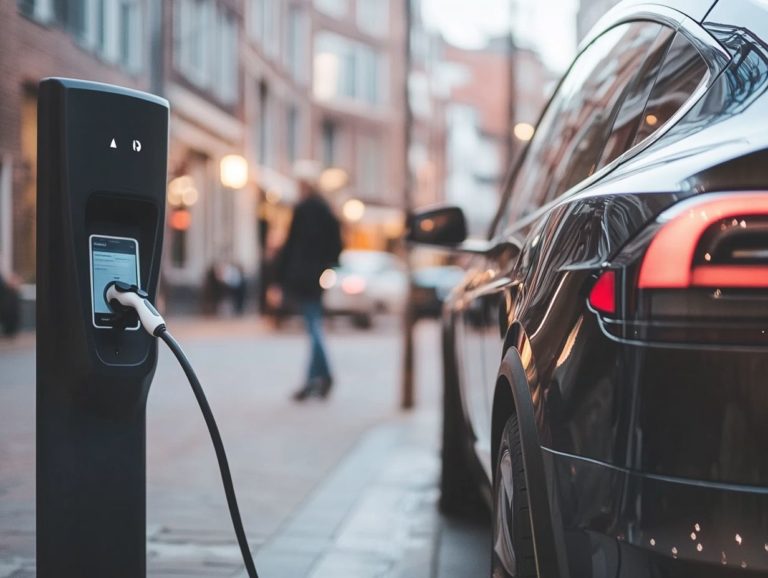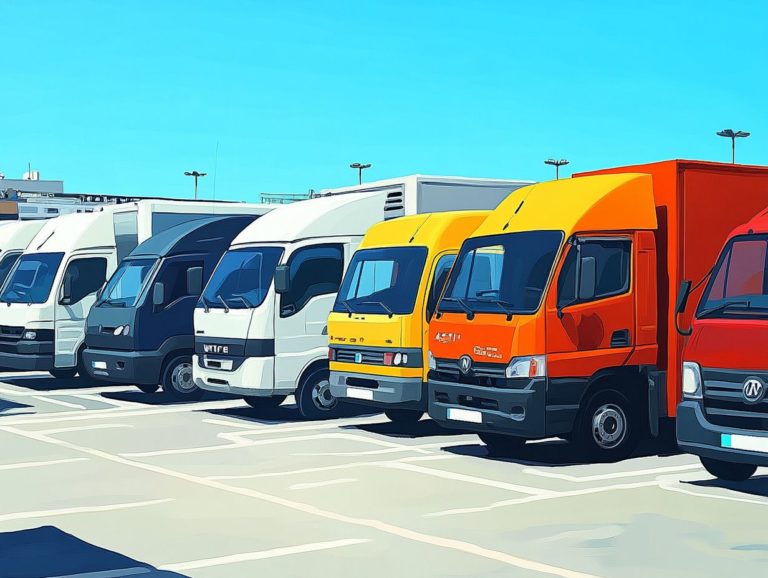What Are the Steps After a Total Loss?
Experiencing a total loss can be profoundly overwhelming, whether it’s due to an accident, a natural disaster, or theft.
Grasping what constitutes a total loss and knowing how to navigate the aftermath are essential steps toward regaining your stability. This article will guide you through the definition and causes of total loss, the crucial steps to take immediately afterward, and how to recover emotionally and practically from such an event.
You ll also find tips on preventing future losses, equipping you to face any challenges that may come your way with confidence and preparedness.
Contents
Key Takeaways:

- Notify your insurance and file a claim immediately after a total loss to begin the recovery process.
- Assess the damage to personal property and prioritize replacing essential items to ease the emotional impact of the loss.
- Take preventative measures for future total losses by being prepared for disasters and having adequate insurance coverage.
Understanding Total Loss
A total loss occurs when the cost to repair your car after an accident is greater than what it s worth just before the loss. This can happen due to various factors, including severe collisions, significant damage, or even the natural depreciation of the car over time.
In evaluating a total loss, entities like the Texas Department of Motor Vehicles may assess salvage titles and guide you through the subsequent insurance claim process.
Definition and Causes
A total loss in vehicle insurance happens when the cost to repair your damaged car exceeds its actual worth. This often occurs after significant accidents or extensive repairs.
In such situations, insurance companies play a crucial role in determining if your vehicle qualifies as a total loss. They evaluate the extent of the damage and estimate repair costs, which typically include labor and parts.
Common scenarios leading to a total loss include collisions, where two vehicles meet in an unfortunate embrace, or natural disasters like flooding or hail damage.
The type of coverage you have collision or comprehensive greatly influences this assessment process. These coverage options dictate how much your insurer will compensate you, ultimately affecting your financial recovery and your decision-making when it comes time to purchase a replacement vehicle.
Steps to Take After a Total Loss
After experiencing a total loss, promptly notify your insurance company and file a claim to start the settlement process. This step is essential for understanding your coverage limits and options for recovery.
Act quickly! This will help you tackle this tough time with both clarity and confidence.
Notifying Insurance and Filing a Claim

Notifying your insurance company after a total loss is a crucial first step in the claims process. This action allows you to file a claim and understand your policy’s coverage limits for a potential settlement.
Aim to make this initial notification promptly to expedite the claims process, as each insurance provider has specific timeframes within which claims must be reported. It’s vital to gather relevant information, such as your policy number, details about the loss, and any documentation that supports your claim like photographs or police reports, if applicable.
Understanding the nuances of your coverage whether it s comprehensive, collision, or liability can significantly influence what you may receive in your settlement. By taking these essential steps, you can navigate the claims process more effectively, ensuring you maximize your benefits.
If you need assistance or want to learn more about managing total loss situations, reach out to us today!
Assessing Personal Property Damage
Assessing personal property damage after the loss of your vehicle is essential to ensure that every affected item, including your belongings inside the vehicle, is accounted for in the insurance claim process.
This thorough evaluation helps you identify the extent of vehicle damage and supports your claims for total loss insurance. Start by documenting each valuable item that was in the vehicle at the time of the incident. Take photographs and note serial numbers whenever applicable.
By keeping this meticulously organized record, you can enhance the credibility of your claim, making it easier for the insurance adjuster to recognize the validity of your losses. Knowing how this assessment affects your compensation gives you more control over your claims.
Recovering from a Total Loss
Recovering from a total loss requires not just maneuvering through the financial details of insurance claims but also confronting the emotional burden that comes with losing a vehicle and the journey of replacing cherished possessions.
Dealing with Emotional Impact
Dealing with the emotional fallout of a total loss can be quite a challenge, as you must navigate feelings of stress and anxiety while also managing the logistics of an insurance claim.
These emotional complexities can often lead to physical setbacks, impacting not just your mental well-being but your overall health as well. Embracing a supportive network of friends, family, or even support groups can offer you a valuable outlet for expressing your grief and frustration.
Engaging in self-care practices think mindfulness meditation or gentle exercise can cultivate a sense of calm amidst the chaos. By prioritizing relaxation techniques and seeking professional help when necessary, you can carve out a pathway to rebuild your resilience and restore balance in your life.
Replacing Lost Possessions

Replacing lost possessions after a total loss requires you to navigate your insurance coverage options to reclaim personal belongings damaged or destroyed in the accident.
Start with a thorough assessment of your lost items, including electronics, clothing, and important documents. Grasping the intricacies of your insurance policy is vital; it outlines coverage limits and deductibles that could influence your total reimbursement.
Vehicle ownership also plays a critical role in these situations, as losing a car often means losing items that were inside it at the time. Therefore, consulting with your insurance agent about coverage for personal belongings typically left in vehicles can be immensely beneficial. This proactive approach can help you recover lost value and minimize any financial impact you may face.
Preventing Future Total Losses
To prevent future losses, take proactive measures. Familiarize yourself with safety standards and ensure you have enough insurance coverage. Implement effective disaster preparedness tips to protect your vehicle.
By staying informed and prepared, you can safeguard your investment and navigate potential risks with confidence.
Tips for Disaster Preparedness
Implementing effective disaster preparedness tips can dramatically reduce the risk of encountering total losses, ensuring that your vehicle remains protected against unforeseen accidents.
By taking proactive measures, such as regularly checking your vehicle s tire pressure, brakes, and fluid levels, you can maintain its integrity during critical situations. Understanding the nuances of your insurance coverage is vital; it gives you peace of mind knowing that you have adequate protection against various calamities.
Assembling an emergency kit filled with first-aid supplies and essential tools can significantly enhance your safety. Furthermore, being aware of safety standards and regulations strengthens your ability to navigate potential hazards, maximizing not only your protection but also your overall confidence behind the wheel when disaster strikes.
Start today! Check your vehicle and prepare your emergency kit to protect your investment.
Frequently Asked Questions
Q: What should I do first after a total loss?
A: Document your lost items and contact your insurance agent for guidance.
Q: How can I emotionally cope with losing my vehicle?
A: Seek support from friends and family and consider engaging in self-care activities.
Q: What are the key insurance terms I should understand?
A: Familiarize yourself with terms like coverage limits, deductibles, and policy exclusions.
What Are the Steps After Your Vehicle is Damaged Beyond Repair?

After your vehicle is damaged beyond repair, the steps you need to take can vary. However, some general actions apply to most situations.
What Should I Do First?
First, ensure everyone involved is safe. If someone is injured, call emergency services and move to a safe location.
Contacting Your Insurance Company
Yes, reach out to your insurance company right away. They will guide you through the next steps and help you file any necessary claims.
Information Needed by Your Insurance Company
Your insurance company will ask for your policy number and details about the incident. They may also need any relevant photos or documents, plus a police report if one was filed.
If You Don’t Have Insurance
If you lack insurance or your coverage doesn t apply, you may need to pay for damages out-of-pocket. Take a close look at your finances to decide your next best step!
Disputing a Total Loss Settlement
You absolutely can dispute the settlement amount if it seems unfair. Gather evidence, like the market value of similar vehicles, to support your claim.






